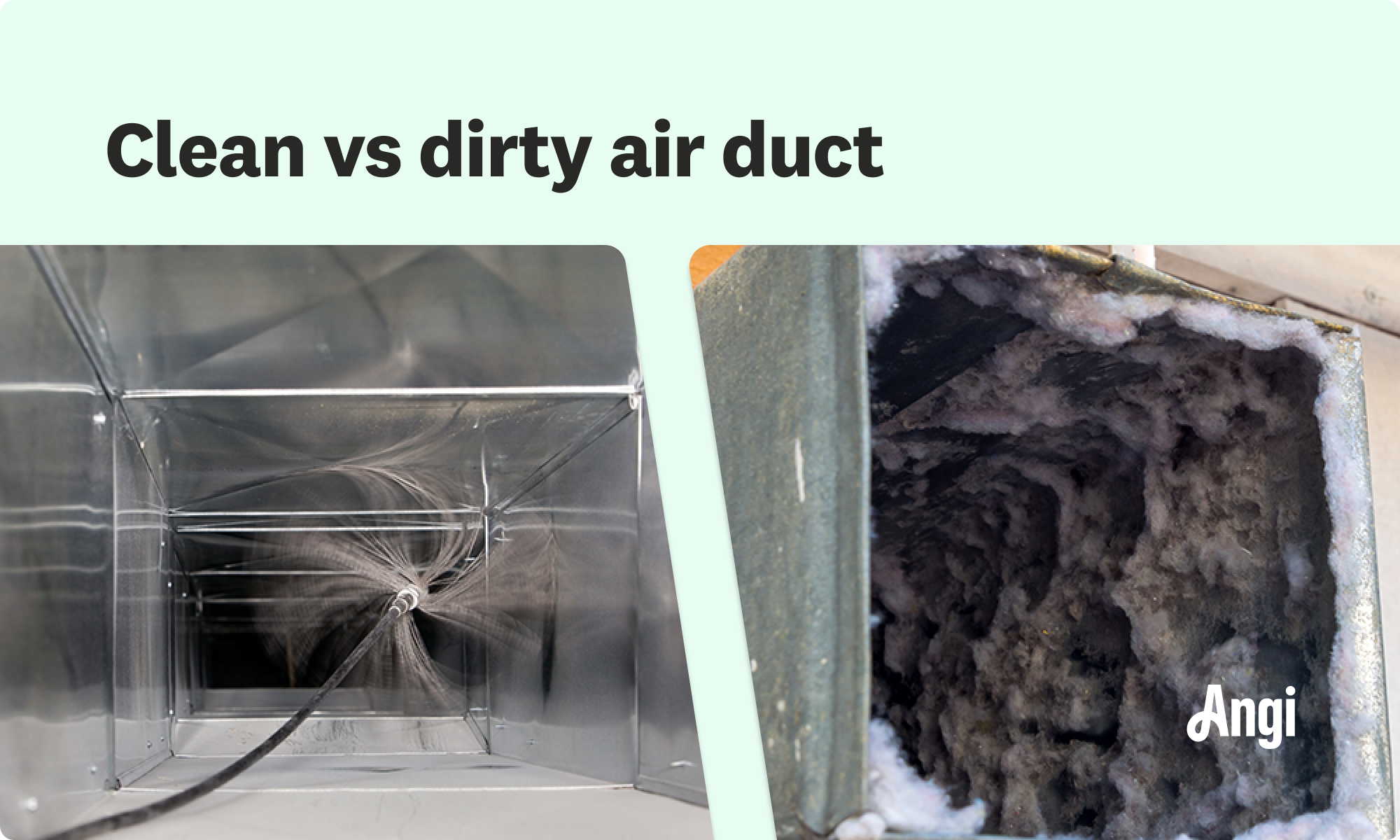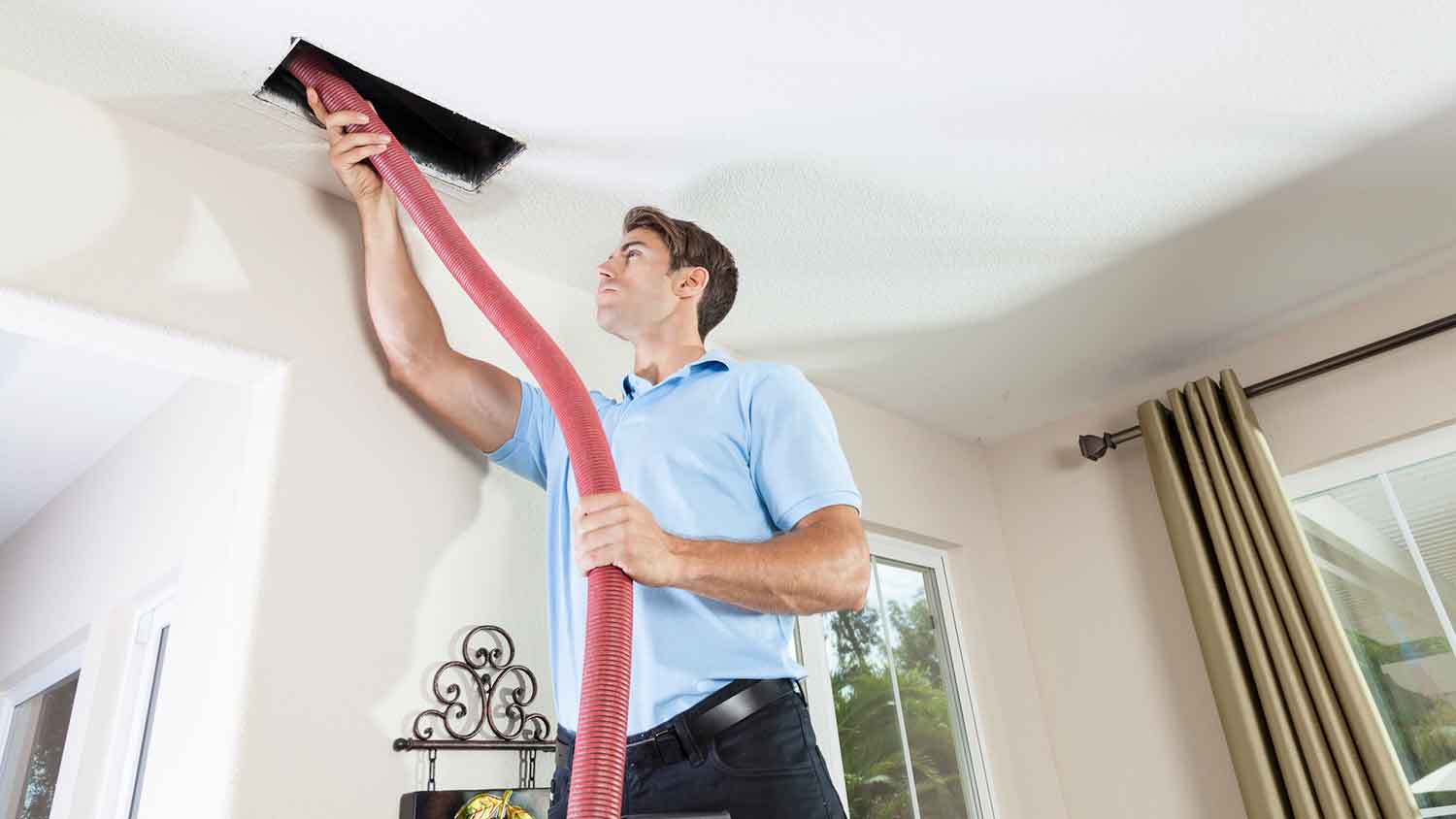Does Air Duct Cleaning Help Get Rid of Bad Smells?
You can’t scrub away all your air duct problems


Duct cleaning may be necessary if there’s dust buildup from a remodel.
Air duct cleaning won’t solve underlying issues like moisture or pest infestations.
If you suspect mold growth, turn off your HVAC and call a mold remediation company.
Damage to your air ducts is one potential risk of air duct cleaning.
If unwanted odors still linger in your home long after you're finished cleaning, the source may be out of sight. Your air ducts can harbor certain odors, and the solution may be to clean them out. However, air duct cleaning won't solve every airborne odor problem. This guide breaks down the benefits of air duct cleaning and its limitations regarding odor elimination.
Air duct cleaning takes an average of five to seven hours for most households. You can make the job go quicker by removing any obstacles around your HVAC entry points, like furniture, to make it easier for your pro to access the ducts.
What Do Air Ducts Do?
Air ducts are an essential part of a home's HVAC system. They take air from an air conditioner or furnace and distribute it throughout the home through supply air vents. In the summer, warm air also travels into ducts through return air vents, where it's transported to be cooled.
Common Causes of Odor in Air Ducts

If you notice a foul or unusual odor in your home, it may be coming from your ducts. Understanding what causes air duct odors can help you determine the best way to solve the problem. Here are some of the most common causes:
Dust: If your air vents are dusty, your ducts may be as well. Dust can catch other debris and result in a stale, musty smell.
Mold: Moisture in your ducts from condensation, leaks, or storm surges can all result in mold growth. Moldy ducts will lead to a musty smell coming from your air vents.
Pests: If you have pests living or dying in your ducts, you may eventually notice odors from their droppings, urine, hair, nests, or decaying bodies.
Pet smells: Another source of animal smells in your ducts could be the dander shed by your dogs, cats, and other pets. In addition to causing odors, pet dander can trigger allergic reactions in certain people.
Smoke: Cigarette smoke coats surfaces in a home, including the interior surfaces of air ducts, with a yellow film. This film leads to a lingering smell.
When Can Air Duct Cleaning Solve Bad Smells?

Most of the time, duct cleaning won't eliminate bad smells from your home. One exception is with a buildup of dust.
Your HVAC system filters out dust and debris, so it won't often accumulate in significant amounts. However, a specific event, such as pest damage or a home remodeling project, can kick up enough debris to cause odors. In these cases, you can hire a local air duct cleaner to clear out the buildup and eliminate the source of the smell.
Most other air duct odors are caused by underlying problems that a duct cleaning won't solve.
Smells That Air Duct Cleaning Won’t Solve
Duct cleaning alone can’t eliminate most odors from your HVAC system. It may improve odors temporarily, but the underlying odor-causing problems will persist. This means odors will return unless you tackle the following problems at the source.
Musty Mold Smells
Mold results from moisture buildup and condensation on ductwork. Poor insulation, duct leaks, excessive humidity, and dirty filters are all potential culprits that duct cleaning won’t fix.
Mold particles in air ducts can make you sick, so if you suspect mold, turn off your HVAC system and contact a local mold remediation service. They’ll test for mold and create a remediation plan. Once they remove the mold, you’ll need to work with an HVAC company to properly seal and insulate your HVAC system to prevent future moisture problems.
Pest Infestations
Rodents, insects, and other pests in your HVAC ducts will create unpleasant odors. A thorough duct cleaning may clear out the mess they’ve already made, but the odors will persist until you remove the infestation completely. If you suspect pests in your ducts, contact a pest control specialist near you to diagnose the problem.
Pet Smells
Pets are constantly generating new messes and smells by shedding dander. Frequent house cleaning and a strong air purifier are the best ways to control pet odors.
Cigarette Smoke
Duct cleaning can help with cigarette odors in a home, but only in certain circumstances. A duct cleaning company can use chemical fogs to deodorize and sterilize the inside surface of sheet metal ducts. It can be harder to get odors out of more flexible ducting materials.
However, full smoke remediation efforts must include sanitizing HVAC coils, priming walls and ceilings, removing old furniture, and running an ozone generator for several hours.
Frequently Asked Questions
The drawbacks of duct cleaning include the expense of professional cleaning and the potential for damage to your ductwork. Flexible ducting is especially prone to damage during cleaning. Another potential risk is that duct cleaning can stir up dust and mold particles that would otherwise not have caused problems in your home.
Air duct cleaning costs an average of $270 to $500, depending on the number of vents and the total length of the ducts in your home. The type of ducts you have also plays a role since flexible ducts are more susceptible to damage and more difficult and time-consuming to clean properly. Expect higher labor costs for difficult-to-access ducts.





- Condensation on Ductwork: Causes and Potential Solutions
- DIY Air Duct Cleaning Tools and How to Use Them
- How to Tell If the Return Air Is Working With These Simple Tips
- How Long Does Air Duct Cleaning Take? 4 Factors That Impact the Time Frame
- Air Duct vs. Air Vent: Learn the Differences Between These HVAC System Parts
- What Are Air Ducts? Understanding Your Home’s Ductwork
- 9 Ways to Balance Duct Airflow
- How Often Do I Need to Clean Air Ducts in My HVAC System?
- Breathe Easy: 10 Tips for Improving Your Indoor Air Quality
- Why Some Rooms Are Colder Than Others and How to Fix It











